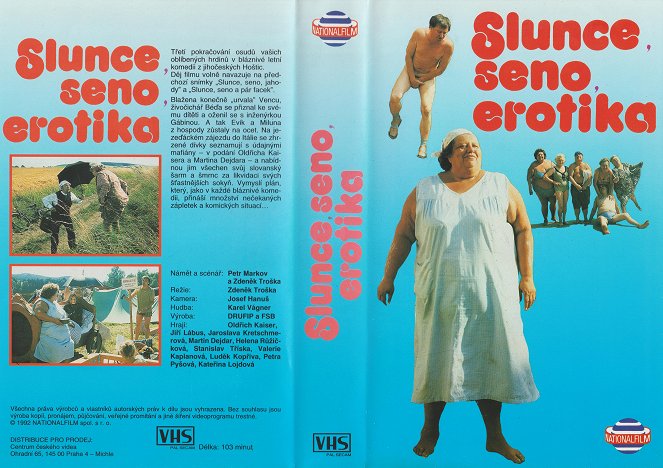Regie:
Zdeněk TroškaKamera:
Josef HanušMusik:
Karel VágnerBesetzung:
Helena Růžičková, Stanislav Tříska, Martin Dejdar, Jaroslava Kretschmerová, Oldřich Kaiser, Petra Pyšová, Valerie Kaplanová, Martin Šotola (mehr)Inhalte(1)
The third, concluding part of a successful sequel of crazy popular comedies by Zdeněk Troška. The plots of the films take place in a collective farm in a small Czech village, the set ORDER of which is confronted with social news. In the last part these are the new opportunities after November 1989, especially travelling abroad and the invasion of lustful eroticism. The film is a sequence of comical numbers during a journey of Czech peasants to Italy and their Italian colleagues to the Czech Republic. (Verleiher-Text)
(mehr)Kritiken (4)
Zdeněk Troška bereitet sich in voller Montur auf seine zukünftigen Meisterwerke vor. Wenn überhaupt, dann erweckt dieser Film zumindest die Illusion, dass er wirklich ein Film ist. Ein sehr beschissener Film, aber dennoch ein Film. Semantik des Wortes "hemdsärmelig" bei Z. Troška: LPG-Dummheit mit ein paar entblößten Brüsten und Schwänzen. Gut als Verhütungsmittel... Semantik des Wortes "Komödie" bei Z. Troška: Humor für geistig Minderbemittelte. Gut vor allem als Mittel gegen Verstopfung.
()
The last part of Zdeněk Troška's village trilogy. It is clear at first sight that this is the least successful part, which occasionally slips into a completely banal story that tries more to show naked women than to attempt a similar biting humor as in the previous films. The best part is undoubtedly the first part, when we are together with selected jézéďáks from Hoštice in Italy, where they get to know how Plánička's method works in practice in a different, more modern environment. The Czechs go abroad. This is a phrase that perfectly describes the situation. A Czech yokel goes to Italy, packs schnitzels and cases of beer to survive because those sea monsters can't be eaten. It's as if we don't go abroad because we want to get to know the foreign country, but because we want the foreign country to get to know us. But who is curious about us abroad? Why do we go somewhere but try to adapt it to the Czech Republic at all costs? Is the Czech Republic so perfect, so much better? If so, why do we even leave? I know that this has already changed a bit, but I am sure that there are still families here who go abroad and instead of trying local cuisine, they prefer to bring something of their own. I know it makes sense, a person doesn't want to spend their vacation with diarrhea, but if I'm afraid of that, why do I go somewhere? I think a vacation of this kind, where we create a little Czech Republic around us, doesn't make sense. We have to try to live in Italy, Greece, etc. for a while. Then we can take something away from it. Not just what we buy at the market and what we can show as proof that we were really abroad and not making it up. The film is most harmed by the second part, where the jézéďáks try to be sophisticated by undressing, moving to the hayloft, and sleeping by the river with a sign. It's just boring at times, especially after watching it several times, you realize that it's actually quite dull. However, I can still confidently recommend the first and second films in the series. Just think about it and ask yourself if there's a piece of yourself in it. More: http://www.filmovy-denik.cz/2012/12/umirajici-zvire-4-vanoce-slunce-seno-2.html
()
This is what it looks like when they open up the borders and the directors can do whatever they want. Suddenly, it’s okay to write in some anti-communism humor and then throw in a pro-communism joke at the end. And it’s still just as fun as the prequels. I don’t know why people think it’s so bad. I didn’t see any big difference, apart from more wieners in this instalment. It wouldn’t even surprise me if it was just for the sake of criticizing popular movies that won’t ever get old, not even when we do.
()
All in all, a few of the jokes here are properly folksy and the new computer test is downright hilarious, but who the hell came up with such a stupid story? I understand the intention of bringing the village bourgeoisie to another culture and vice versa, but such a parade of awkward twists and subliminal humour is hard to see even in Italy. It's still saved by quite likeable characters (the best is the phlegmatic Škopek and His Reverence), but it's not really watchable any more, and the nudist sequences as a reflection of the new liberal horizons are completely out of place.
()
Galerie (7)
Photo © Centrum českého videa / NATIONALFILM spol. s r.o.


Werbung